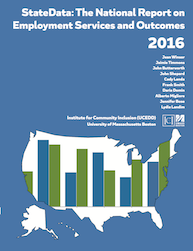Cady Landa
Cady Landa has expertise in empirical research; teaching, technical assistance, and coaching; nonprofit management; and public policy and program implementation and management. She has worked for state and local governments, local education agencies, and nonprofit agencies. Areas of expertise include safety net programs, education, Medicaid, intellectual and developmental disabilities, parenting, youth development, mental health, and public finance. Cady prefers participatory and collaborative methods and focuses on equitable, universal access to public services across difference, overcoming stereotypes, and overcoming exclusion. Her research addresses immigrants' and their children's access to public services.
PhD and MA, Social Policy, Brandeis University Heller School of Social Policy and Management / MPP, Public Policy, Harvard Kennedy School of Government / BA, History and English Literature, Cornell University
Our Stories - Young Adults, Work, and Personal Experience During the COVID-19 Pandemic
This archived webinar from May, 2020 features the stories of self-advocates employed to conduct research on transition practices. These researchers shared how social distancing and the use of technology have affected their work and other parts of their lives, such as staying in touch with family, friends, and support staff.
Pushing the Integrated Employment Agenda: A Case Study of Oklahoma’s High-Performing Employment System
Read this brief to learn about the factors that contribute to the effectiveness of Oklahoma’s success in achieving integrated employment outcomes for individuals with IDD across three state systems: IDD, vocational rehabilitation (VR), and education.
The Power of Disability Employment: The Impact to Arizona’s Economy
Arizona’s working-age population (ages 16–64) of people with any type of disability (10.2%) who are working hovers around the national average (Erickson, Lee, & von Schrader, 2019). In addition, individuals with a disability in Arizona, as in the nation as a whole, are more likely to live in poverty (30.5% and 26.1% respectively).
Data Note: Exiting Vocational Rehabilitation with Employment, by Race, for Individuals with Intellectual Disability
There is a long-standing pattern of black/white racial disparity in employment in the general U.S. population. This Data Note explores whether this racial employment disparity, that characterizes the general population, is also found in the employment outcomes of people with intellectual disability (ID) who receive services from the vocational rehabilitation (VR) system.
Pushing the Integrated Employment Agenda: A Case Study of Maryland's High-Performing Employment System
This brief provides a summary of how the Department of Education, the Department of Rehabilitative Services (MD's VR agency), and the Developmental Disabilities Administration (MD's IDD agency) reflect the elements of the High Performing States model.
StateData: The National Report on Employment Services and Outcomes
Community of Practice on Demonstration Projects: Collaboration and Systems Change
Beginning in FY 2012 and 2013, the Administration on Intellectual and Developmental Disabilities (AIDD) funded eight Partnerships in Employment (PIE) systems change projects under the Projects of National Significance program. PIE is a national transition systems change project whose purpose is to identify, develop, and promote policies and practices to improve transition, post-secondary, and competitive employment outcomes for individuals with intellectual and developmental disabilities (IDD).
Data Note: Reasons for Exiting VR Services Without Employment
Only 23% of adults with intellectual disabilities work, compared to 73% of people without disabilities (statedata.info). To bridge this gap, the vocational rehabilitation (VR) program offers valuable services including assessment, job search assistance, and counseling. In FY 2014, over 46,000 adults with intellectual disabilities exited the national VR program. About 38% of them reported an employment outcome.
Partnerships in Employment: Summary of Section 1915(c) Home and Community Based Services Waivers and Section 1915(i) State Plan Home and Community Based Services
This is a resource document prepared for a Community of Practice (COP) on using Medicaid funds as a resource to support individual integrated employment. The COP is hosted by the Partnerships in Employment Training and Technical Assistance Center for Partnerships in Employment grantees. The goal of the COP will be to provide opportunities to learn about the ways in which 1915(c) Home and Community Based Waivers and 1915(i) State Plan Home and Community Based Services have been used to support integrated employment in federal statue and in states with PIE grants.
